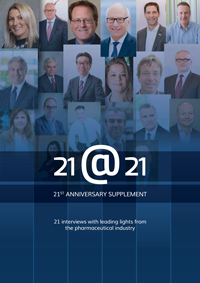Pfizer: Concentrating on core areas to improve lives
Posted: 4 January 2018 | Beatriz Faro - Pfizer | No comments yet
For Pfizer, putting patients first guides its actions, informs its strategic decisions and unifies colleagues in every region and function across the company. Beatriz Faro, Regional President, Internal Medicine, International Developed Markets at Pfizer, explains how the company’s philosophy is taking the business forward…
What would you say have been the most significant developments in the pharmaceutical industry over the past 21 years?
The sequencing of the human genome at the turn of the 21st Century has transformed our understanding of disease and our ability to deliver care in a way that is specific and personal to each individual patient. As a result, personalised medicine is set to reduce the burden of disease by targeting prevention and treatment more effectively – and in ways that better meet the individual needs of the patient.
[insert_php] if ( zmember_valid_subscription() ) { echo ‘
DOWNLOAD THE ENTIRE 21st ANNIVERSARY SUPPLEMENT NOW
‘ ; } else { echo ‘
DOWNLOAD 21 @ 21 SUPPLEMENT PDF – SUBSCRIBE FREE (OR LOGIN)


Not yet a subscriber? Join our growing community of thousands of industry professionals and gain access to:
- Bi-monthly issues in print and/or digital format
- Case studies, whitepapers, webinars and industry-leading content
- Breaking news and features
- Our extensive online archive of over 8,500 articles and past issues
- …and it’s all free!
‘; } [/insert_php]
In addition – as has been widely documented – patent expiries and declining R&D productivity have prompted the pharmaceutical industry to change its operating model significantly over the past couple of decades. As part of this process, the industry has progressively tailored its pipeline to specialty medicines and biologics targeted for high unmet medical needs. Locating research units in bioscience hotspots or innovation clusters has also enabled industry scientists to work closely with external researchers and clinicians in a much more open and collaborative way.
How has your company evolved to meet these challenges?
Patients inspire us and the work we do. Putting patients first guides our actions, informs our strategic decisions and unifies colleagues in every region and function across the company.
Six years ago, we implemented a longterm strategy to position Pfizer for a return to top-line growth. Since then, we have worked to shape the quality of the assets in our pipeline by sharpening our focus on core research areas that give us the best opportunity for scientific and commercial success, so helping us to improve the lives of patients. These areas include biosimilars, inflammation and immunology, metabolic disease and cardiovascular risks, neuroscience, oncology, rare diseases and vaccines.
We believe that collaboration is the key to whatever we accomplish. We undertake to evaluate any opportunities likely to improve our clinical expertise and consequently have a wide range of ambitious and effective scientific partnerships across the world. Each of these focus on the promotion of scientific excellence and, ultimately, on the discovery of breakthrough therapies that meet unmet medical needs.
For example, we received breakthrough therapy designation from the US Food and Drug Administration (FDA) for a haemophilia gene therapy being developed in partnership with SPARK Therapeutics in 2016. In the same year we acquired Bamboo Therapeutics – a privately held biotechnology company focused on developing gene therapies for the potential treatment of patients with certain rare diseases, such as Duchenne muscular dystrophy and Friedreich’s ataxia.
We also have a collaboration with 23andMe, which includes studies to aid understanding of depression, dysmenorrhea and the genetic heterogeneity of lupus and inflammatory bowel disease. Through efforts such as this, we believe we are poised Beatriz Faro, Regional President, Internal Medicine International, Pfizer to potentially usher in a new era of patient care defined by targeted research methods and ultimately better patient outcomes.
Looking ahead to the next few years, what do you think are likely to be the main opportunities and challenges affecting the industry?
I think the realities of an ageing population and the burden of chronic diseases, as well as advances in treatment and technology, are likely to encourage growth within the industry. However, providing sustainable access to healthcare will be a significant global challenge. As a result, payers will continue to impose cost constraints and scrutinise the value medicines offer far more carefully. Companies will be expected to use real-world data to demonstrate that new treatments are clinically and economically superior to existing therapies.
In addition, healthcare has undoubtedly become more patient centric. The digital revolution has empowered patients, enabling them to secure the information they need to make informed decisions about their treatment options and this has dramatically affected the ways in which the industry communicates with them.
Finally, the convergence of IT and healthcare is impacting the pharmaceutical model. Big data and mobile health are starting to transform healthcare and diagnostics, with organisations such as Apple and Google encroaching on territory that was traditionally the reserve of pharmaceutical companies. Smartphones, sensors, wearables, apps and so on are all collecting remote, objective data in real time and so better measuring patient outcomes.
How is your company preparing for these developments?
The success of our business begins and ends with the health of our patients. This means continuing to strengthen our understanding of patient experiences, engaging in strategic partnerships and investing in the most advanced technology that will help to drive innovation in public health.
We continue to evolve the way we engage with patients, their families and the healthcare community around the world. Through various public health initiatives, we are working to bridge significant health gaps in patient education and care by equipping people with trusted information and tools that enable them to take a more active role in their healthcare.
By recognising that putting patients first is the only way healthcare companies can expect to thrive, we strive to be patientcentred in our thinking and action. We ask patients what they need and what they expect from any new therapy we plan to introduce.
For example, we have an exciting, firstof- its-kind research collaboration with IBM focused on Parkinson’s disease where we are developing a system of hundreds of remote sensors and mobile devices to provide realtime, around-the-clock disease symptom information. The ultimate goal is to obtain a better understanding of the progress of a patient’s disease and response to medication so informing treatment and clinical trial design, while also speeding the development of new therapeutic options.
We also believe that diversity is as crucial to creating a successful business as it is to building a vibrant culture. We therefore surround ourselves with colleagues of diverse backgrounds and abilities who can contribute unique viewpoints and perspectives to all aspects of the business, from drug development to marketing. This is a topic that is particularly close to my heart.
What would you say has been your company’s outstanding achievement (or achievements) of recent years, and what impact has this had on patients and potentially the industry in general?
Clearly, this is the positive impact we have had on people’s health. Our commitment at Pfizer is to ensure that individuals have the opportunity to lead healthier lives. While, for us, this starts with discovery and development of medicines, it is only made a reality when individuals everywhere have access to quality medicines and healthcare. Together, with partners around the world, progress has been made in advancing longer and healthier lives.
For example, our donation of an antibiotic used to treat blinding trachoma in partnership with the International Trachoma Initiative (ITI), as well as the implementation of the WHO-recommend SAFE strategy, played a pivotal role in eliminating trachoma as a public health problem in Morocco – obviously an impressive achievement.
Successful innovations in pharma are likely to increasingly rely on partnerships and collaborations between manufacturers, suppliers, academics, and a whole range of other companies and organisations. What do you look for in these relationships, and can you give an example of one that has worked particularly well for you?
We believe that working with others that have an interest in health and medicine contributes to better overall outcomes for patients, healthcare providers and healthcare systems. We foster collaboration to develop solutions for preventing disease, restoring health and keeping people well at all stages of their lives. This includes discovering and developing high-value therapies and working together to increase access to important medicines for greater numbers of people.
For example, we have a global strategic alliance with Merck KGaA to develop and commercialise an investigational drug as a potential treatment for multiple types of cancer. Together, we are forging a strong capability in immuno-oncology, an approach to treatment that rallies the body’s natural defences – and this was a new theory just a decade ago. We believe we are now well positioned to capitalise on what many believe will be the future of cancer treatment – immuno-oncology agents combined with more conventional therapies.
In addition, we have launched a global network of Pfizer innovation hubs in Berlin, London, New York, Stockholm, Sydney, Tel Aviv and Toronto in the past three years. These are dedicated to helping late-stage digital healthcare start-ups achieve their own goals by enabling them to grow and reach more patients and providers through collaboration with our mentors and partners. We are committed to our patients and believe that partnering and collaborating with others who share a similar purpose will accelerate the development of solutions to help improve lives.
Pfizer profile
Pfizer is one of the world’s premier innovative biopharmaceutical companies. Since 1849 we have been committed to helping people live longer, healthier lives and today, the medicines we produce save or improve lives. With the help of our research partners, we apply the latest science and technology to discover new therapies, actively collaborating with universities, governments, foundations and patient advocates, so that more people around the world have access to better health. We currently employ approximately 96,500 people, working across 46 countries and we reported full-year 2016 revenues of $52.8bn, reflecting 11% operational growth.









